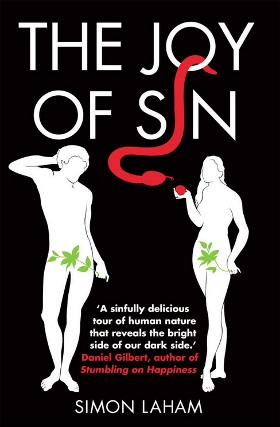Is sin good for you?

Is sin good for you? An article in Saturday’s Sydney Morning Herald suggests it can be [1]. Quoting from a recent book by experimental psychologist Simon Laham [2], the article suggests that rather than being “deadly sins”, Lust, Sloth etc might actually be good for you. No doubt we’ll hear more when Laham appears on the ABC’s Q&A program on Monday October 1 [3].
As a Christian, I guess you’d expect me to disagree with Laham. However, I think there is room for heavily qualified agreement.
 Yes, “sin can be good for you”
Yes, “sin can be good for you”
It all depends how we define “sin”, measure “good”, and qualify “can be”.
Laham defines “sin” in such a way that I have to agree with him, it can be good.
In his book, The joy of sin, Laham defines “lust” as “activation of the sexual behavioural system”. As God invented sexuality, surely “activation of the sexual behavioural system” is a good thing. In the SMH article, Laham is quoted as saying the modern-day equivalent of “sloth” is “people [having] time on their hands”. Once again, isn’t that “sin” a good thing?
Laham measures “good” in a narrow way. He suggests “activation of the sexual behavioural system” improves a person’s performance in “analytic reasoning” tests. That sounds like a good outcome. But is this an adequate measure of the impact of “sin”?
Laham qualifies the goodness of sin by saying it “can be” good for you. But only if we ignore the impact of sin on our selves, on our relationships, and particularly on our relationship with God.
No, sin is not good for you
The problem with sin is that it enslaves. It is addictive. And if the Bible is right, it clouds our judgement about what’s right and wrong. I always find it intriguing that I’m capable, having read of some corporate fraud, of being outraged by it; yet the next minute I’m covering myself with a “white lie”.
Sin harms others. For example, lust might improve my analytic reasoning but it objectifies women. My sloth might give me some spare time, but it may also cause my family to go without. Laham can only claim sin is good by ignoring its social impact.
And finally, sin can only be “good” if we forget God. Here’s the advice one Bible author gives a young man [4] …
Be happy, young man, while you are young,
and let your heart give you joy in the days of your youth.
Follow the ways of your heart
and whatever your eyes see,
but know that for all these things
God will bring you to judgement.
It’s trendy to imagine that there is no God to whom we’ll have to give account. But what if there is? We’ve all sinned. Where do we stand?
Jesus has an answer. We are sick and he has a cure [5] …
While Jesus was having dinner at Levi’s house, many tax collectors and “sinners” were eating with him and his disciples, for there were many who followed him. When the teachers of the law who were Pharisees saw him eating with the “sinners” and tax collectors, they asked his disciples: “Why does he eat with tax collectors and ‘sinners’?” On hearing this, Jesus said to them, “It is not the healthy who need a doctor, but the sick. I have not come to call the righteous, but sinners.”
[1] Seven deadly sins - they can be really good for you, Sydney Morning Herald, Sept 22, 2012
[2] Joy of Sin: The Psychology of the Seven Deadly Sins, Simon Laham, Constable & Robinson, 2012
[3] Q and A, ABC TV, October 1, 2012
[5] Mark 2.15-17

